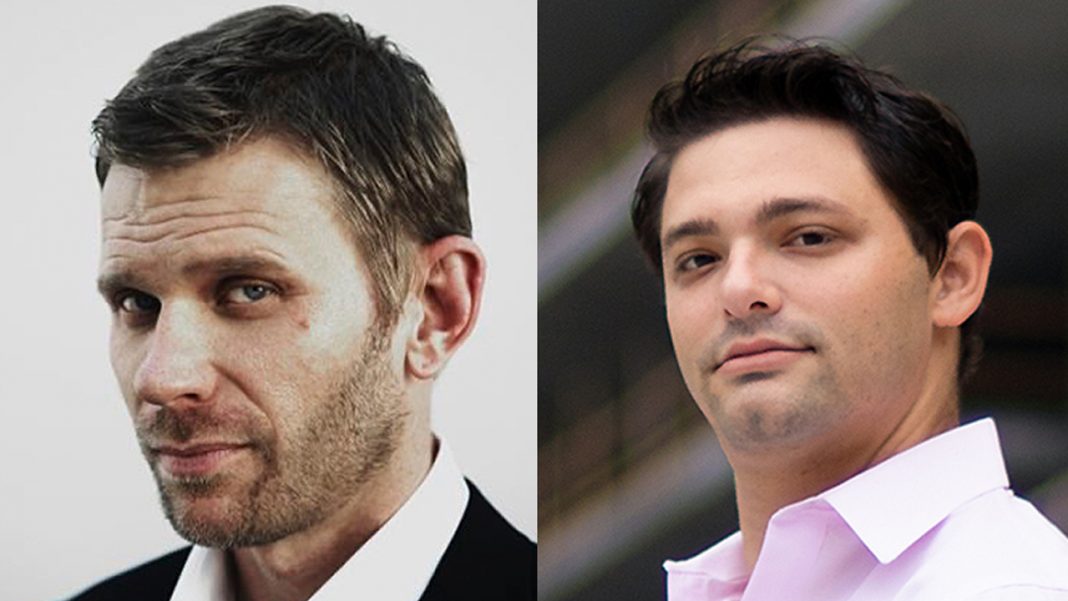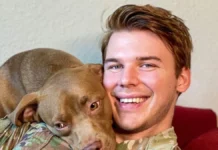It’s time, guys. It’s time to start making social media a place where accountable communication is the rule for all, not just a select few with a blue checkmark by their name. And for actor Mark Pellegrino and internet attorney and our very own Senior Editor, Andrew Rossow, launching their Guardian Project is the way to do it.
Pellegrino, known for his role as “Lucifer” on the CW’s Supernatural and Netflix’s 13 Reasons Why, is extremely outspoken on social media against online hatred, libel, and defamation. As we’ve learned from the King of Hell himself, he’s no stranger to real bullying in the physical world, off-screen.
It’s time to stand up against bully culture, Rossow told us, revealing that he and Pellegrino’s backgrounds and upbringing are so eerily similar, that the decision to join forces against online bullying was a no-brainer.
True Hollywood Talk spoke with Pellegrino about their upcoming Kickstarter, set to launch on Tuesday this week.

True Hollywood Talk: You’ve recently announced the launch of ‘The Guardian Project.’ Tell us how the idea of the ‘Guardians’ came to be and how it has impacted you personally?
Mark Pellegrino: The idea was hatched by a friend on social media. She and a number of fans had taken it upon themselves to defend my reputation during repeated attacks.
This seemed to work at mitigating the verbal violence, threats, and piling on because it wasn’t me fighting them–a fact these trolls counted on for prestige. Also, they were so precise, honest, and logical. The trolls had nowhere to go and eventually gave up and moved on to pick on someone else. My friend (@archluminous) and I joked that she was my bodyguard.
From that suggestion (and several conversations plus a charity event later), ‘The Guardians’ was born.
THT: Can you share with our readers what we can look forward to as you continue to roll-out this project?
MP: The ideal is a TV show that enables victims to confront victimizers and obtain some form of justice. Whether that justice is restitution in the form of material payback for the harm caused by spreading false narratives, or the reform of the victimizer, we seek to empower victims of social media slander, libels, and bullying by letting the victimizers know that anonymity will not protect them from the consequences of their actions.
We hope that finding innovative ways of verifying people‘s identities, without compromising their privacy will lend itself to more civil discourse, as anonymity promotes bad-faith actors and accountability promotes responsibility.
THT: From a conceptual standpoint, why did you feel now was the best time to put this together? What were you missing that you didn’t have before?
MP: What was once a fringe activity engaged in by a small number of deviants, has now become commonplace. Debate aversion and divisiveness are fostered by our culture in general and social media in particular. Since the practice of bullying those you don’t agree with has reached epidemic proportions and more people are being swept up in ‘cancel culture’ as victims AND victimizers, there is a new awareness about the harms that this approach to discourse is causing (epidemic depression, anxiety, and suicides amongst teenagers). Minus a cultural revolution, it’s time to step in and bring accountability back to our public discourse.
THT: You’ve previously talked about “different waves of bullying” that you have personally experienced. How did you personally approach and address each wave?
MP: By confronting them head-on.
The problem with this method, however, is that it has the opposite effect that it has in one on one physical confrontations. Physical aggression can be met with retaliatory aggression (or the threat of it) and that can discourage further attacks. The type of aggression you find on social media, however, is relational aggression… and, far from being discouraged by counterforce, it is inspired and encouraged by it. It revels in the spotlight for its own sake; meaning the recognition you give a troll by fighting them, is the payoff. There are no downsides.
After I realized that personal confrontation with those who sought to hurt me was more beneficial to them than me, I deferred that responsibility to others. The Guardians took up the mantel of my reputation so I wouldn’t have to.
THT: Why, in your opinion, do platforms like Facebook, Twitter, and Instagram, among others, need to be held accountable for the content it hosts?
MP: I don’t know that platforms need to be held accountable per se; certainly the people posting lies, slanders, violence, or attempting to harm someone’s livelihood by the spread of lies, should be held accountable.
I don’t think Facebook or any social media platform can take the time to research the validity of every post that finds its way onto their platform, but individuals who pass on information certainly can, and it’s individuals I want to hold accountable. Although there is clearly no reason known terrorist groups or their affiliates should have a social media platform, giving a platform to murderous organizations is certainly irresponsible, and social media platforms that do it should feel the pinch of that)
THT: How has technology in your opinion, shaped the way people behave online?
MP: I’m not a fan of reducing freewill to a non-element or claiming that factors determine ANY aspect of human action.
Anonymity certainly promotes incivility because people will neither (1) be held accountable for the things they say nor (2) relate to the victim as a real person with real-life and real pain. But promotion is not shaping.
Rather, a culture that inculcates emotional reasoning will simply be more erratic, violent, exchange averse, tribal. Tech is just following the culture and enabling the full expression of what is already there. A culture that still held rational principles of inquiry, and debate and held objective truth as a standard of value would do just fine with tech. Tech is not the disease, it’s a mechanism by which we can detect the symptoms of the deeper disease of emotionalism.
THT: How do you use social media, both professionally and personally?
MP: I use it primarily as a conduit for ideas; philosophical and political debate. Secondarily, I use it as a means of promoting my work and the work of my friends.
THT: You’re known for many roles over the years (Dexter, Lost, Supernatural, 13 Reasons Why). What lesson can you share with fans and readers that you took away from each of your roles?
Dexter
MP: Dexter was about using principles to redirect bad impulses for the good. If more people simply did that, the world would be a much better place (of course we have to agree on what ‘the good’
Lost / Netflix’s ‘13 Reasons Why’
MP: Lost and ‘13 Reasons Why’ were about how we need each other to realize our highest potentials. Individuals are a community project, not in the collectivist sense of being bound to each other by duties, but in the individualist’s sense that society enables us to be better than we would be on our own.
Supernatural
MP: Supernatural, was about heroism and free will. It showed me that no obstacle, even God himself, can overcome the heroic in humanity.
THT: How does your portrayal of Deputy Bill Standall on ‘13 Reasons Why’ play into The Guardian Project?
MP: [13 Reasons Why] helped me to see that what you say and do to people matters. There is no time at which you are not a significant factor in someone’s life for better or worse; so, if you can choose to be an influence for the better, why not choose that?
The hardest part about playing that part was being an officer of the law who breaks the law. The law is what stands between us and savagery. It makes life orderly and allows us to settle disputes in relative peace. But agreed-upon rules of conduct don’t always capture the nuances of the human situation. They don’t always render justice. (As we saw with the character of Brice Walker).
Deputy Stendall breaks the laws of men to act on deeper laws of love and justice. It’s dangerous territory to tread. I’m glad I only had to do it on film.
THT: How can people become part of the ‘Guardians’ and The Guardian Project?
MP: To join the ‘Guardians’ community, you can put the ‘Guardian’ symbol on your social media profile page, using the ‘devil’ and ‘angel’ emojis, as so– ?Guardian?. This tells people that you stand for justice, truth, civility. And then act on it.
Put your money where your mouth is and engage those who seek to harm others online. Refuse to participate in groups that pile on people. Be the voice of reason in the crowd.
As for The Guardian Project, you can donate to our Kickstarter which officially launches October 27, which goes towards helping fund the docuseries to properly pitch to the appropriate network producers. Help us move forward to make the world a better place for open discourse.
THT: How has COVID-19 impacted your career, both good and bad?
MP: My official life has been put on hold, but that time has enabled me to focus on multiple projects I might never have gotten around to.
THT: What other projects can we look forward to seeing you in on TV?
MP: It’s a secret for now ?
You can stay updated with what Pellegrino and Rossow are doing by following The Guardian Project on Twitter (@GuardianProj), Instagram (@theguardianprojectofficial), and Facebook (@TheGuardianProjectOfficial). For press inquiries, please contact Studio Matrix at studiomatrixweb@gmail.com.








